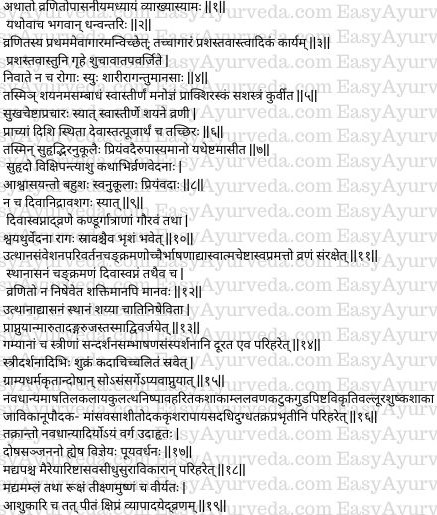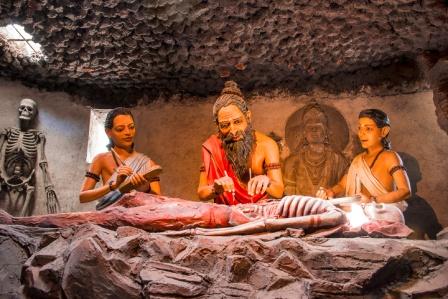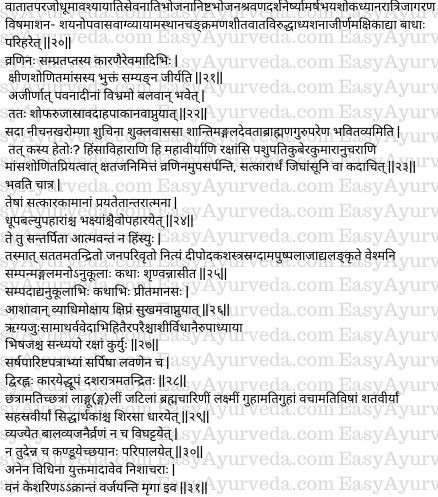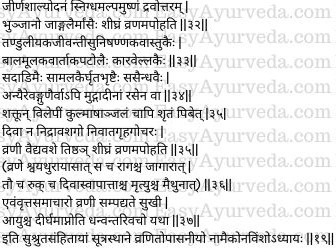Sushruta Samhita Chapter 19 Vranitopasaniya Adhyaya

This article explains Sushruta Samhita Sutrasthana Chapter 19 “Vranitopasaniya Adhyaya” Care of the wounded.

Vranitopasaniya Adhyaya- Care of the wounded
We will now explain the chapter by name Vranitopasaniya- care of the wounded person, as revealed by the venerable Dhanvantari.
Read – Charaka Vrana Chikitsa – 25th Chapter – Wounds, Ulcers
Table of Contents
Vranitagara – Ward for the wounded
First of all, a chamber shall be selected and arranged for the wounded person to stay. The selected chamber should be constructed in an auspicious land and should have been constructed in accordance with vastu shastra (science of architecture) etc. A person residing in such an auspicious house (house built on an auspicious land) built in accordance with science of architecture, which is clean (free from dirt), free from sunlight (heat of the sun) falling directly and heavy breeze will not suffer from physical, mental and traumatic disorders.
Arrangement of bedding in the ward for the wounded
In such a house (chamber) proper arrangement for sleeping should be done so that the patient can sleep conveniently. The bedding should be free of troubles (comfortable to sleep), wide and long (with proper dimensions), covered with clean cloth, pleasant to the mind, fit to keep the head to the east direction (pillow towards east), and having the weapons placed beneath the pillow (to be used for protection from enemies, animals etc.).
The wounded person should sleep on a wide bed, convenient for easy movements (of body parts and other activities), comfortable enough to change position and sides while sleeping. Since the Gods reside in the east, the person should sleep keeping his head in that direction as a sign of worship (respect).
The wounded living in company of good and affectionate friends in the ward
In such an auspicious house (ward), the wounded person should reside or sleep (on the comfortable bedding), in the company of affectionate friends who talk pleasingly, as much and as long as he likes.
Friends telling stories of many kinds, will drive away the discomfort (pain) of the wound (in the wounded) and by comforting and pleasant conversation assure the person (of cure).
Read – Madhava Nidana Chapter 43 Sadyo Vrana Nidanam
Ahita Acharika
Activities and foods to be avoided
He (wounded person) should not sleep during the day. By sleeping during the day itching in the wound, feeling of heaviness of the body, swelling, pain, redness and exudation – all become greatly increased.
He should carefully protect the wound during his activities such as raising, sitting, turning, walking, speaking loudly etc. The wounded person should not indulge in standing, sitting, walking for a long period and sleeping during the day, in spite of him being strong. Too much indulgence in standing, sitting, sleeping etc., will lead to aggravation of vata which in turn would lead to manifestation of various kinds of pain in the body parts. Therefore, these activities shall be avoided.
He should avoid seeing, talking and touching the woman with whom he is eligible for sexual activities from a long distance itself. By seeing etc. of women, his semen would get dislodged (from its normal seat) and flow out (gets ejaculated). Then the person will suffer from all the bad effects of copulation though he actually has not done it.
He should not partake (as food) freshly harvested grains, Masa (black gram), tila (sesame), Kalaya (round pea), Kulatha (horse gram), nispava (cow gram), haritaka saka ( leafy vegetables), things which are sour, salt and pungent in taste, Guda (jaggery / treacle), eatables made from flour, dry meat, dry vegetables, meat and muscle fat of goat, sheep and animals living in marshy places and in water, cold water, Krsara (rice cooked along with green gram), Payasa (milk pudding), curds, milk, buttermilk etc.
Things enumerated above commencing with freshly harvested grains and ending with buttermilk is known as Dosa Sanjanana varga (group causing aggravation or Tridosha). They cause an increase in doshas and also increase in (formation of) pus.
Notes: Dalhana mentions haritaka saka as comprising Kuthera, Sigru, Surasa, Sumukha, Ausuri, Bhutena, Mulaka and Cukrika.
The person habituated to wine drinking (alcoholic addict) should avoid using Maireya, Arista, Asava, Sidhu and by-products of Sura.
Wine which is sour, dry, penetrating, hot in potency and quick acting, if consumed destroys the wound (produces great damage) quickly.
Read – Asava And Arishta – Advantages, Usage In Children, Side Effects
He should also avoid too much indulgence in breeze, sunlight, dust, smoke, mist, dew, consuming food in excess quantity, use of disliked foods, hearing unpleasant sounds, seeing unpleasant and disliked things, jealousy, anger, fear, grief, worry, keeping awake at nights, consuming incompatible foods; irregularity of sleeping, fasting, speaking loudly and physical exercise, standing still in a place, roaming in forbidden places, exposure to cold wind, consuming wrong and unhealthy combination of foods (mixture of mutually opposite / incompatible foods), eating repeatedly in short intervals (before the previously taken food is digested), indigestion (foods which cause indigestion) and trouble by flies etc.
In the wounded person, troubled by the above causes (or any other causes), and in whom (wounded person) the blood and muscles have been depleted; the food which has been ingested does not get digested. Due to this indigestion, there will be immense aggravation of doshas (vata, pitta and kapha). This in turn would lead to manifestation of swelling, pain, discharges (exudation), burning sensation and suppuration (pus formation).
Disciplined life recommended for a wounded person
He should always keep his nails and hairs short; be clean, wear white dress, resort to observance of propitiatory and auspicious rites, devoted to (service of) gods, Brahmanas and teachers. For what reason (he should follow all these things)? Because the Raksasas (demons) who roam around (seek pleasure) in harming others, who are very powerful, followers (retinue) of Pasupati (Shiva), Kubera (God of wealth) and Kumara (Sanmukha) who are fond of flesh and food, move about near the wounded person either in search of blood, for receiving worship or for killing the person (if not worshipped and offered oblations).
Read – Injury, Wound care Ayurvedic Remedies, Medicines
How to satisfy the demons?
Those demons who desire worship, should be worshipped, with great devotion, frequently, by offering incense (fragrant smoke), ritual worship (with prayers, flowers etc.), oblations (flesh blood etc., of animals killed) and other eatables.
When demos become satisfied (with worship, oblation etc.) they will not cause any harm to the person, who remains disciplined. Hence the wounded person should always remain without lassitude (without yielding to sensual pleasure) surrounded by people (friends, relatives etc.), reside in a house (chamber/ ward) decorated with lights, water, weapons, garland, rope (cloth band), flowers, Laja (parched rice) etc. and spend his time, keeping his mind pleased with wealth, music and listening to stories which are benevolent, auspicious and pleasing to the mind.
He who listens to stories bestowing wealth, auspiciousness and pleasantness to the mind, and remains hopeful for the cure of the diseases, obtains happiness (health) quickly.
Read – Shashti Upakrama Meaning, Classification, Clinical Significance
Raksha Karma
Protective rite
Both the priest and the physician should perform protective rites daily during the unions i.e., junction of night and morning and junction of morning and night (early morning and early evening) as stipulated in Rig, Yajur, Sama and Atharva Vedas and other benedictory hymns for the protection of the patients.
Dhupa
Fumigation
Fumigation of the chamber should be done for ten days, twice a day without laziness, using Sarsapa, leaves of Arista (neem) added with ghee and salt.
Chatra, Atichatra, Lanhali, Jatila, Brahmacarini, Laksmi, Guha, Atiguha, Vaca, Ativisa, Satavirya,Sahasravirya and Siddharthaka – should be worn on the head (as amulets).
The wound should be fanned with a fan made of hairs (of animals) but it should not be hit, pricked or scratched while in sleep.
By resorting to these activities from the beginning, Nisacaras (night prowlers / demos) get away from the patient just like other animals run away from the forest invaded by the lion.
Read – Dhoopana (Dhoopam, Fumigation) Blends, Benefits, Procedure, Mode of Action
Sanskrit Verses



Hitahara
Suitable foods
Little quantity of cooked rice (porridge) prepared from old rice which is made unctuous and warm, with more of liquid (water), and consumed (daily) along with the meat of animals of desert like regions, helps in healing of the wound quickly.
Soup prepared from Tanduliyaka, Jivanti, Sunisannaka, Vastuka, Balamulaka, Vartaka, Patola and Karavellaka, fried in ghee, mixed with rock salt, powder of pomegranate and juice of Indian gooseberry (Emblica officinalis) should be consumed. Also, other substances similar in qualities like those mentioned above and cooked rice shall be taken along with soup of mudga (green gram) etc. One should also use saktu (paste of flour), vilepi (gruel), kulmasa (cooked pulses) and boiled water.
Notes: – The word “Dravottaram” actually means” with more of water” but in this context it is interpreted as ‘beyond water / without water’ – by Dalhana and other commentators, because intake of more water is prohibited in patients with wound.
The wounded person should not sleep during the day, should remain inside a house / chamber devoid of breeze and under the control of the physician (promptly follows the instructions of the physician) gets cured of the wound quickly.
Swelling of the wound occurs due to exertion (of any type), redness (and swelling) due to keeping awake, at night. Swelling, redness and pain occur due to sleeping at day time. Swelling, redness, pain and death will occur due to copulation.
The wounded man who adheres to this regimen (food and activities) obtains happiness (health) and longevity surely, as per (as said by) the words of Dhanvantari.
Thus ends the nineteenth chapter by name Vranitopasaniya, in Sutra sthana of Sushruta Samhita.









